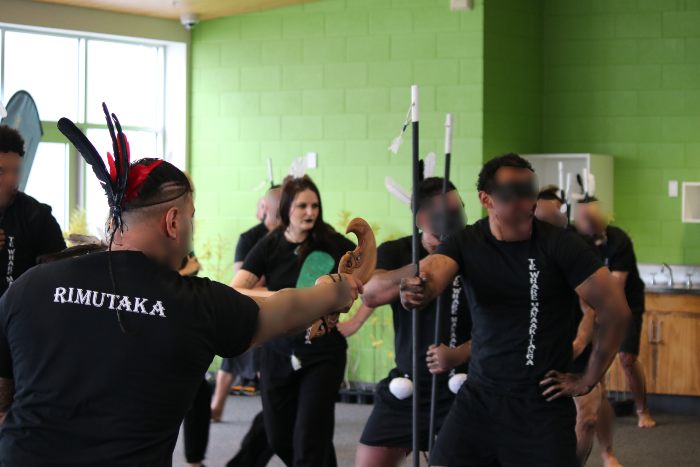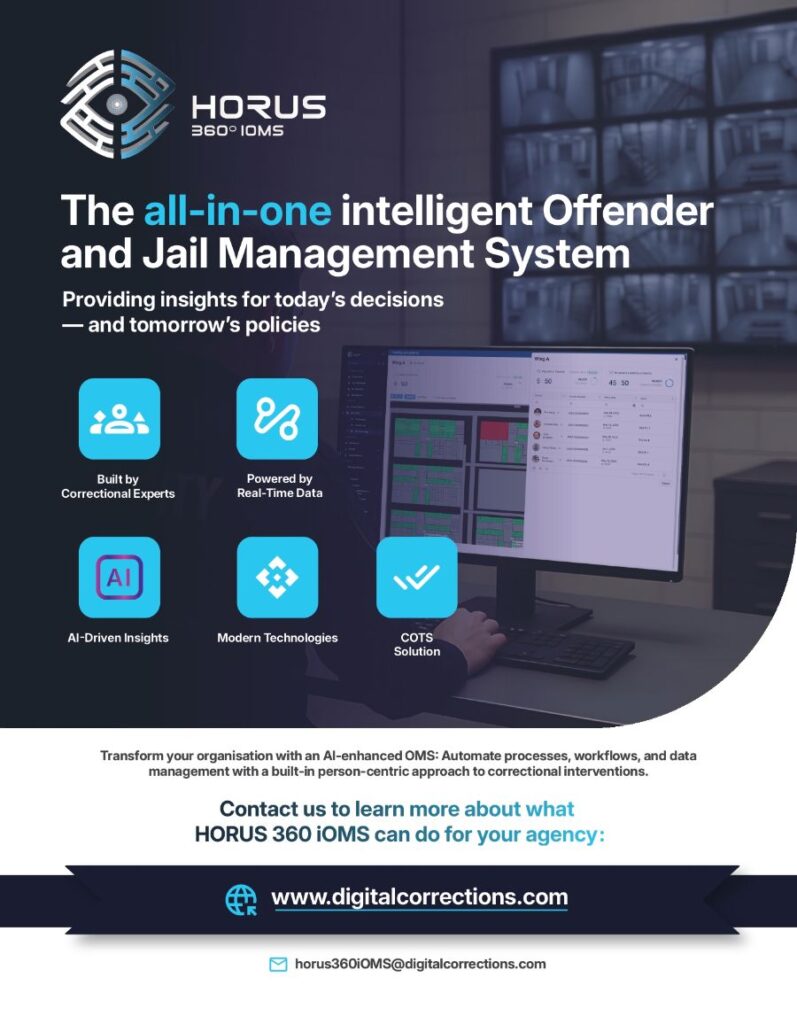Interview
Jessica Borg
Chief Psychologist and Director Programmes at New Zealand’s Department of Corrections
Jessica Borg leads the design and delivery of rehabilitation programmes and psychological services across New Zealand’s Department of Corrections. With responsibility for ensuring that these interventions are both evidence based and culturally responsive, she plays a central role in shaping how the Department of Corrections responds to the needs of people in prison and on remand.
In this interview, she shares the Department of Corrections rehabilitation strategy for the growing number of people held on remand, the development of new approaches and treatment pathways, and the importance of continuous evaluation and cultural practice in reducing reoffending and improving outcomes – especially for the Māori population, who remain overrepresented in the system.
What are the current challenges and priorities in delivering effective rehabilitation programmes within New Zealand’s corrections system?
JB: A priority and vision for me is to ensure we continue providing evidence-based and culturally responsive rehabilitation services that reduce re-offending and improve people’s wellbeing. Correctional rehabilitation in New Zealand is underpinned by the Risk-Need Responsivity model. We therefore prioritise those at a high risk of serious re-offending and also provide less intensive offence focused programmes to people at a medium risk of re-offending. Young adults are also prioritised. In addition, given the New Zealand context, and the overrepresentation of our indigenous population (Māori) who make up more than half of the prison population, another priority is to ensure that our interventions are effective with all groups and that a focus of our work is on reducing this overrepresentation.
One of the current challenges we are facing in Corrections New Zealand is the growing prison population especially in remand. Currently 43% of people in prison in New Zealand are on remand, either accused of an offence and awaiting trial in prison or convicted and awaiting sentencing. The average time spent on remand has significantly increased and a greater percentage of people are released with “time served” on sentencing. This changing prison population profile means people are spending longer in remand, reducing their opportunity to engage in rehabilitation and reintegration services.
In Budget 2024, the New Zealand Government committed $78 million for Corrections to extend rehabilitation programmes to include people on remand, specifically delivering offence-focused interventions for those convicted. Since then, we have been reviewing rehabilitation and reintegration programmes to assess what services can be made available to people on remand and creating an implementation plan to ensure the funding is used effectively.
Given the increase in prison population, another consistent priority has been to improve access to rehabilitation programmes and address barriers both from a responsivity perspective as well as the operational challenges we face. This also requires us to be agile and flexible in how we design and deliver rehabilitation while maintaining the integrity of the programmes. For example, we have seen a decrease in the number of young adults in prison, so we designed our intervention so it can be delivered either in groups or individually.
How does the Department approach the planning and development of rehabilitation programmes? What innovations or new approaches are being explored to improve rehabilitation outcomes in New Zealand?
JB: The needs of those we manage in prisons and the community has significantly shifted. Alongside the growing prison population and increasing number of people on remand, we have seen a rise in the number of violent prisoners and more people presenting complex mental health and addiction issues.
It’s important that the programmes and services we offer best serve the needs of the population we are managing now – and will manage in the future. Our services must be flexible and responsive to ensure that people are getting the right support at the right time. New Zealand Corrections has been working hard to optimise our services so we can achieve this. This includes understanding people’s needs and orienting our service delivery system around the demand.
We must invest our resources in the most effective treatment and support for those who need it most.
We are taking an evidence-based approach to determine which services should be prioritised, and this will remain an ongoing and evolving area of work. As a first step, we look at the rehabilitation and reintegration needs of the people we manage. First, we defined key cohorts by segmenting the populations we manage in prison and in the community into groups based on the type of offence and their assessed risk of reoffending. We built a data model to support this work and to help forecast the demand for different types of services.
Next, we looked at the specific needs of each of these groups and considered the most appropriate pathway to support them through our system.
We then reviewed all our rehabilitation and reintegration services to assess how well they would support those pathways and meet the needs of at least one of the five main groups we identified. This also involved looking closely at the effectiveness of these programmes and services and whether they are achieving what they were set up and funded to do. This process ensures we are focusing our funding on well-targeted, well-used programmes and services that produce results in reducing reoffending, keeping the public safe, and reducing Māori overrepresentation.
When we identify a need for new offence-focused rehabilitation programmes, my team is responsible for securing funding, designing and implementing pilots, training the psychology and programme facilitator workforce, and providing psychological review, evaluation, and quality assurance. One recent example of this process was the development of enhanced services for women at a high risk of violent offending.
Treatment programmes delivered in Special Treatment Units (STUs) achieve the greatest reductions in reoffending. This has been consistently reflected in our results over nearly two and a half decades. STUs are the most intensive group-based treatment programmes we offer in prison and are designed for people at high risk of reoffending, particularly those convicted of violent and sexual offences.
Until recently, all STUs were located at male prison sites, along with one in the community, also for men. While we did have programmes for women, these were only accessed in mainstream units rather than within a therapeutic environment, as is in place for men. Over the years, we have learned that rehabilitation is most successful when delivered in environments like STUs, which are underpinned by therapeutic principles that enable people to focus on their growth, ability to be vulnerable, challenge, and learn new ways towards desistance from crime.
In 2024, we expanded these services to women, opening two new therapeutic units in Christchurch and Auckland. These units and the programmes delivered are designed through a gender responsive and trauma-informed lens.

JT: In 2024, the Corrections Amendment Act broadened the definition of ‘rehabilitation programme’ to include various cultural and therapeutic approaches.
How do you ensure that rehabilitation programmes are evidence-based and effectively tailored to meet the needs of New Zealand’s diverse prison population?
JB: Within New Zealand Corrections, rehabilitation programmes are designed and delivered by psychologists, programme facilitators and Māori practitioners who are trained and experienced in Western and Māori approaches, to varying degrees. Registered psychologists in New Zealand are required to work in a way that is responsive to cultural diversity and upholds the commitments of the Treaty of Waitangi.
As such, the rehabilitation programmes we offer are designed with both Western and Māori models and approaches to ensure they are responsive to the needs and worldviews of the people we manage. It has been demonstrated that Māori can benefit from treatment models aligned with dominant correctional frameworks, such as the Risk-Need-Responsivity model, when enhanced with Māori approaches.
For example, an evaluation of the Te Piriti Special Treatment Unit for men who have sexually offended against children showed that when compared against a matched group with similar offence history, men who have attended the programme have sexually reoffended at a lower rate overall with a stronger – and statistically significant – reduction in recidivism for Māori.
The reduced sexual recidivism for Māori, with an approximately 50% reduction in relative risk, supported the key rationale for the programme of integrating Māori principles in group-based, cognitive-behavioural treatment for men with sexual offences.
What strategies are in place to embed research and continuous evaluation into the rehabilitation programmes, and how do these strategies inform policy and practice?
JB: We monitor the impact of our services on reoffending through ongoing research into their effectiveness, using both quantitative and qualitative analysis and research. Since 2001, Corrections has been applying the Rehabilitation Quotient (RQ) analysis. To our knowledge, we are the only jurisdiction in the world to routinely subject interventions to such assessment on an annual basis and publish the results as part of our annual reporting.
The RQ measures the difference in reoffending outcomes between those who participated in a specific intervention and a comparable group who did not take part in that intervention. In addition to RQ analysis, the Department undertakes quality and integrity monitoring, collates administrative data, and conducts evaluations of interventions.
Ongoing quality monitoring activity, formal evaluation, and investment in staff training is something that our teams are continuously doing.
Corrections New Zealand offers a solid training package to practitioners delivering rehabilitation programmes that covers risk assessment, treatment modalities, cultural models, trauma-informed care, supervision, and more. We also host a yearly conference for all psychologists and programme facilitators, supporting continuous learning and development across the workforce.
A good example of research that helped inform policy is the evaluation of the Short Intervention Programme for men assessed at a low risk of sexually reoffending against children. The evaluation carried out in 2021 showed that the programme yielded no positive outcomes and provided a number of recommendations to the Department of Corrections. As a result of this research, Corrections was able to make key decisions on the treatment pathways of people with sexual offences. The programme was discontinued and replaced with a new intervention designed for those assessed as a medium risk of reoffending sexually towards children, which better met the needs of our prison population and aligned with evidence-based practice.
Moreover, RQ results, alongside other forms of information and assessment, inform the Department’s decisions to engage in more intensive quality assurance, programme evaluation, or redesign. One such example is the redesign of the drug treatment intervention suite when RQ results showed poor outcomes.
In addition to periodic reviews of our programmes to ensure they remain effective, we also undertake second line quality assurance of our offence-focused rehabilitation programmes, as well as the practice of psychologists and programme facilitators. This is a continuous exercise which involves senior psychologist and programmes staff who spend time with delivery teams, observing delivery of sessions, interviewing staff and people who engage in the programme. The aim is to identify both strengths and areas for improvement, which are shared and discussed with teams and leaders, with further training provided where required.
What innovations – whether technological, therapeutic, or systemic – do you see as most promising for transforming rehabilitation and psychological services within Corrections?
JB: A transformation that I am particularly proud of during my time as Chief Psychologist is the development of a bicultural framework for Correctional Psychologists in New Zealand, called Tikanga Takirua.
We needed a framework to support clinicians designing and delivering rehabilitation programmes through a bicultural lens. Tikanga Takirua provides that foundation and is applied in the evaluation of rehabilitation programmes to ensure that both arms of expertise inform the review and future redesign of the programme. We also have Māori practitioner roles within our STUs. These practitioners are involved in the co-delivery of our high intensity programmes for women, help maintain the cultural norms and principles of the unit and support the men and women in their own journey of cultural identity and practice of cultural approaches through their treatment.
Cultural supervision is offered to all psychologists and programme facilitators alongside regular clinical supervision. This is a space to discuss how to enhance practice from a different worldview, better understand the needs of those they work with, explore effective methods of engagement, and address personal biases or barriers to support the men and women that we work with. Investing in opportunities for clinicians to enhance their practice both clinically and culturally is something I consider to be critical.
Jessica Borg
Chief Psychologist and Director Programmes at New Zealand's Department of Corrections
Jessica Borg is the Chief Psychologist and Director Programmes at the Department of Corrections, New Zealand since October 2019. She is responsible for overseeing the department’s psychological services and rehabilitation programmes. Jessica is also the President Elect of the International Association for Correctional and Forensic Psychology (IACFP). Jessica has worked in Corrections for 17 years both in the frontline as a Clinical Psychologist and in National Office in various leadership roles. Before joining Corrections, Jessica worked in Child and Adolescent Mental Health Services. She holds a BA in Psychology (Hons), MA in Clinical Psychology, and a MA in Human Rights and Democratisation. Jessica has a strong desire to see effective and just outcomes for people in the Justice system.
Advertisement



